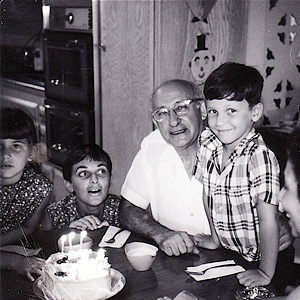The Birth of the Birthday Cake
Both the Greeks and the Germans lay claim to inventing the birthday cake. Of course, the Greeks claim to have invented everything, so I'm not surprised.
In Ancient Greece, flat, round cakes of honey and nut meats called plakous were given in offering to the moon goddess Artemis on her special day of celebration-- the world's first Moon Pie, if you will.
The Romans, as was their habit, adopted this Greek custom, but latinized the cake's name to placenta and expanded upon the idea of annual celebrations. Whereas the Greeks had limited their cake offerings to the gods, the Romans took a shining to the idea of the birthday, celebrating those belonging to their Emperor-du-jour and his family, to important military heroes, even to one's own city. One's50th year is said to have been celebrated with a cake make of flour, cheese, honey, and olive oil. Placenta, delicious placenta.
Of course, neither the Greeks nor the Romans bothered to come up with a new word for cake, since little distinction was made between these cakes and bread.
No, it is rumored that our word for cake is derived from a 13th Century Norse word: kaka. Cake, it would seem, was in need of a greater marketing strategy.
It was the Germans who really put the concept of the modern birthday cake on the map. In the Middle Ages, sweetened bread dough was made into the shape of the Baby Jesus wrapped in swaddling clothes and eaten cannibalistically on that biggest of all birthdays, Christmas. I am reminded of the story a friend once told me of how is family celebrates that holiday every year. His mother walks into the dining room carrying a peppermint-frosted birthday cake (because Jesus loves both you and peppermint) and everyone bursts into a rousing rendition of "Happy Birthday". Not, I hope, "Happy Birthday, Jesus".
Mercifully, the idea of a bready Christ-child lost some of its appeal, but the tie-in of child + birthday = celebration survived in the form of the Kinderfest-- a child's birthday party. In centuries past, it was usually the custom to regard children as either mini-grown-ups, free sources of labor, or simply not at all, since it was most likely that he or she would not survive into adulthood. It was the Germans, with their proto-modern Geburtstagtorten, who helped to pioneer the warm and fuzzy regard with which we now regard the young. At least our own. And the birthday cake.
Candle Power
It's impossible to talk about birthday cakes without regarding their source of power-- the birthday candle.
Fire is, of course, a source of both light and heat. It is therefore symbolic of the sun's power and, as such, the use of it in religious rights is not at all surprising. The smoke from these fires -- from candles or burnt sacrifices-- would rise, curling its way up to Heaven, to whichever god one was worshipping at the time. The Greeks sometimes placed candles upon their cakes, as they did with Artemis, and lit them as they prayed. With the round cakes glowing like the moon, they sent their prayers skyward with the smoke. It is essentially that tradition we still follow, though we no longer call them prayers, but wishes, which sounds less religious, yet more unreasonably hopeful, and we light up German Chocolate or Wacky Cakes instead of Moon Pies, because that somehow seems more comfortable to us.
We place the same number of candles on our cakes as the number of years we have lived but, no matter how many candles there might be, we get just one wish. The more candles on the cake, the more difficult it is to blow them out in a single breath, as is the wish-making custom. If anything, this symbolizes not only the complexities of aging, but also the growing unlikelihood of our ever getting what we wish for. For the young, the act of blowing out candles is one of hope. For the elderly, it can be an exercise in frustration and futility, which might explain why my family stops counting candles for someone when their age exceeds the number of candles in a standard box-- 24.
Whatever you might read into the tone of this post, I am not completely cynical about the birthday cake, its traditions, and its powers. I don't believe so much in the making of wishes by blowing out candles, though I enjoy the symbolism behind the act. The real power of the birthday cake comes from the fact that, if it is made from scratch, it tells the recipient that he or she has been thought of in advance, is loved.
 I am entering into high birthday season. Not only my own, but about half of the people I know. We’re Summer babies-- the product of cold-weather snuggling and perhaps a little too much Holiday Cheer. I suspect that my own conception had something to do with Nixon's 1968 presidential victory. I shudder, yet I am grateful. And, as I type this, I realize that today is the 100th anniversary of my paternal grandmother's birth (the smiling profile at the lower right of the photo, eleven months before I was born). Of course, she hasn't been celebrating it herself for some years, which isn't surprising-- she's dead.
I am entering into high birthday season. Not only my own, but about half of the people I know. We’re Summer babies-- the product of cold-weather snuggling and perhaps a little too much Holiday Cheer. I suspect that my own conception had something to do with Nixon's 1968 presidential victory. I shudder, yet I am grateful. And, as I type this, I realize that today is the 100th anniversary of my paternal grandmother's birth (the smiling profile at the lower right of the photo, eleven months before I was born). Of course, she hasn't been celebrating it herself for some years, which isn't surprising-- she's dead.